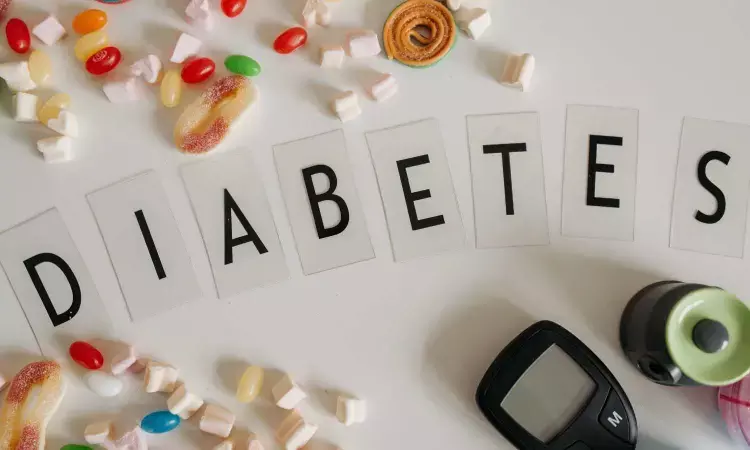- Home
- Medical news & Guidelines
- Anesthesiology
- Cardiology and CTVS
- Critical Care
- Dentistry
- Dermatology
- Diabetes and Endocrinology
- ENT
- Gastroenterology
- Medicine
- Nephrology
- Neurology
- Obstretics-Gynaecology
- Oncology
- Ophthalmology
- Orthopaedics
- Pediatrics-Neonatology
- Psychiatry
- Pulmonology
- Radiology
- Surgery
- Urology
- Laboratory Medicine
- Diet
- Nursing
- Paramedical
- Physiotherapy
- Health news
- Fact Check
- Bone Health Fact Check
- Brain Health Fact Check
- Cancer Related Fact Check
- Child Care Fact Check
- Dental and oral health fact check
- Diabetes and metabolic health fact check
- Diet and Nutrition Fact Check
- Eye and ENT Care Fact Check
- Fitness fact check
- Gut health fact check
- Heart health fact check
- Kidney health fact check
- Medical education fact check
- Men's health fact check
- Respiratory fact check
- Skin and hair care fact check
- Vaccine and Immunization fact check
- Women's health fact check
- AYUSH
- State News
- Andaman and Nicobar Islands
- Andhra Pradesh
- Arunachal Pradesh
- Assam
- Bihar
- Chandigarh
- Chattisgarh
- Dadra and Nagar Haveli
- Daman and Diu
- Delhi
- Goa
- Gujarat
- Haryana
- Himachal Pradesh
- Jammu & Kashmir
- Jharkhand
- Karnataka
- Kerala
- Ladakh
- Lakshadweep
- Madhya Pradesh
- Maharashtra
- Manipur
- Meghalaya
- Mizoram
- Nagaland
- Odisha
- Puducherry
- Punjab
- Rajasthan
- Sikkim
- Tamil Nadu
- Telangana
- Tripura
- Uttar Pradesh
- Uttrakhand
- West Bengal
- Medical Education
- Industry
Chickpeas a Diabetes-Friendly Dietary Addition

Diabetes, a global health concern affecting one in eleven adults, has witnessed a surge in cases over the past three decades. Both type 1 and type 2 diabetes contribute to blood sugar irregularities, escalating the risk of cardiovascular complications. While dietary control, including the incorporation of chickpeas, is recommended, the extent of its efficacy has been a subject of exploration.
A recent comprehensive study delves into the impact of chickpea consumption on blood sugar levels, shedding light on its potential role in diabetes management. This study was published in Nutrients by Nam T. and colleagues.
Key Findings:
- Global Diabetes Scenario:
Diabetes prevalence has reached significant proportions, affecting one in eleven adults worldwide.
The past 30 years have witnessed a notable rise in diabetes cases, underscoring the urgency for effective management strategies.
- Chickpeas and Blood Sugar Control:
Comprehensive searches across multiple databases yielded 12 selected studies involving 182 participants.
Chickpeas, recognized for their nutritional richness, were assessed for their efficacy in lowering blood sugar levels in healthy or normoglycemic adults.
- Comparative Analysis:
Chickpeas were compared to various foods, including wheat, potatoes, pasta, sauce, cheese, rice, and corn.
Meta-analysis results highlighted the superior effectiveness of chickpeas in reducing blood glucose incremental area under the curve (iAUC) when compared to potatoes and wheat.
- Nutritional Attributes of Chickpeas:
Chickpeas exhibit low starch digestibility, high fiber content, and significant levels of protein.
These nutritional attributes, coupled with hormonal effects, contribute to their potential in blood sugar control.
- Insulin Benefits and Statistical Significance:
While insulin benefits were observed, the statistical significance varied among the studies.
Chickpeas emerge as promising components of diabetic diets, emphasizing nutrient-rich foods over processed carbohydrates.
The study underscores the potential of chickpeas as a valuable addition to diabetes management through their impact on blood sugar control. The findings highlight the importance of incorporating nutrient-rich foods into diabetic diets, with chickpeas standing out as a favorable option. As global diabetes rates continue to rise, understanding the role of dietary interventions, such as chickpea consumption, becomes crucial for comprehensive diabetes care.
Reference:
Nam, T., Kim, A., & Oh, Y. Effectiveness of chickpeas on blood sugar: A systematic review and meta-analysis of randomized controlled trials. Nutrients,2023;15(21):4556. https://doi.org/10.3390/nu15214556
Dr Riya Dave has completed dentistry from Gujarat University in 2022. She is a dentist and accomplished medical and scientific writer known for her commitment to bridging the gap between clinical expertise and accessible healthcare information. She has been actively involved in writing blogs related to health and wellness.
Dr Kamal Kant Kohli-MBBS, DTCD- a chest specialist with more than 30 years of practice and a flair for writing clinical articles, Dr Kamal Kant Kohli joined Medical Dialogues as a Chief Editor of Medical News. Besides writing articles, as an editor, he proofreads and verifies all the medical content published on Medical Dialogues including those coming from journals, studies,medical conferences,guidelines etc. Email: drkohli@medicaldialogues.in. Contact no. 011-43720751


